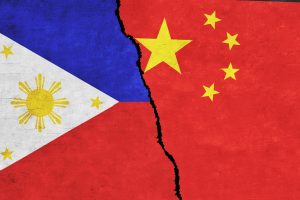The Philippines is committed to working with China to manage tensions in the South China Sea after a clash earlier last week that saw a physical confrontation between personnel from the two nations, the Philippine foreign minister said yesterday.
Addressing a Senate hearing yesterday, Foreign Secretary Enrique Manalo said that the government would continue to pursue “confidence building measures” with Beijing via the established Bilateral Consultation Mechanism on the South China Sea.
“We still believe it is the primacy of dialogue, and diplomacy should prevail even in the face of these serious incidents, though of course I admit it’s also a challenge,” he said, according to a Reuters report.
“We will pursue the peaceful resolution of disputes in accordance with international laws, specifically the U.N. Convention on the Law of the Sea and the 2016 Arbitral Award. And we have been working hard to bring back China to the table to talk with us to resolve differences on these issues,” Manalo added.
Manalo’s comments come after an incident on June 17 in which Chinese vessels forcefully blocked a Philippine resupply mission to its isolated outpost at Second Thomas Shoal in the Spratly Islands. During the operation, Chinese personnel on motorboats repeatedly rammed and then boarded two Philippine navy rigid-hulled inflatable boats in order to prevent Filipino personnel from transferring supplies, including firearms, to the BRP Sierra Madre, a warship that Manila grounded on the shoal in 1999. In the ensuing melee, a number of Filipino navy personnel were wounded, including one who reportedly lost his right thumb.
The incident marked the culmination of 18 months of tensions around the shoal, which has now emerged as the primary flashpoint in the South China Sea. The Philippine military likened the action to “an act of piracy,” and the Department of Foreign Affairs has since lodged a diplomatic protest with China over the clash.
At the same time, the Philippines has remained defiant in its exercise of its rights. On Friday, Defense Secretary Gilberto Teodoro pledged that the Philippines will continue to resupply its troops aboard the Sierra Madre. He added that he will not publicize the schedule of its missions, emphasizing that they do not require permission or consent from anyone.
Similarly, Manalo said that any confidence building measures would not come “at the expense of the promotion of our sovereignty, sovereign rights as well as our rights and jurisdiction in the West Philippine Sea.” He added, “We are not blind to the incidents that are happening.”
The call for “confidence building measures” may seem out of step with public sentiment in the Philippines in the wake of the June 17 incident. But there is clearly a need for more, and better, diplomatic engagement between Manila and Beijing. One of the most notable aspects of recent frictions over Second Thomas Shoal is the degree to which the two sides have talked past each other, in often dismissive or emotive language.
Of course, it remains to be seen whether the Chinese side has any interest in diplomatic intercourse that does not begin from a position of recognizing China’s sovereignty over the Second Thomas Shoal and other Philippine-occupied features in the South China Sea. Sure enough, the Chinese Foreign Ministry said on Monday in response to Teodoro’s comments that the Philippines “should stop its infringement and provocation” and “work with China to safeguard peace and stability in the South China Sea.”
































